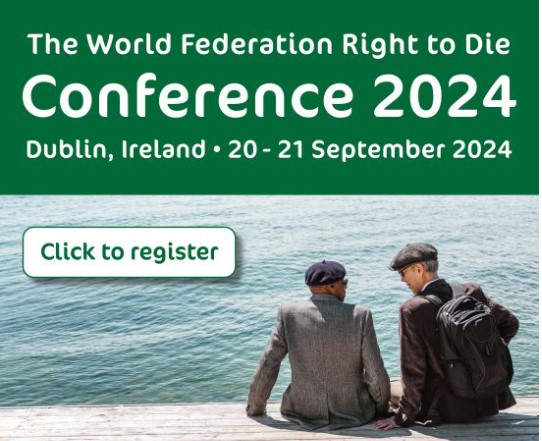
Last month, End of Life Ireland hosted the 2024 international conference of the World Federation of Right to Die Societies, which pro-euthanasia campaigners from around the world attended. Several speakers at the conference made no secret of their wish to see euthanasia and assisted suicide permitted on very broad grounds indeed, far beyond the terminally ill. They are not even trying to hide the slippery slope.
On 17th October, the Dáil will vote on the Report of the Joint Oireachtas Committee on Assisted Dying, which recommends both euthanasia and assisted suicide for patients with an incurable and irreversible condition. We can already see the ambition of campaigners to go much further than this.
Speakers at the conference included Justin McKenna and Jane Lazer of End of Life Ireland. When they appeared before the Oireachtas Committee, they expressed a wish that euthanasia and assisted suicide be made available on broad grounds. They clearly stated their aim to extend assisted suicide to include patients suffering from conditions such as dementia and multiple sclerosis. Some of what they had to say can be found here.
Another speaker was Colin Brewer. He is worth noting because he was struck off the medical register in Britain in 2006 for serious professional misconduct. According to The Guardian, he had provided “patients with a lethal cocktail of drugs that led to the death of one and the development of further addictions in several others”.
Later, Brewer revealed that between 2013 and 2016 he had helped six British patients with dementia to end their lives at assisted suicide clinics in Switzerland, despite none of these patients being terminally ill. Although Brewer was no longer licensed to practise in Britain, he nonetheless assessed these patients’ mental capacity to choose death before their trips abroad.
Why did the Irish speakers seem happy to share a platform with him?
Brewer is an advocate for euthanasia not only for those suffering from dementia but also for “patients with motor neurone disease, stroke and other intractable and/or progressive conditions don’t want to face years of intolerable quality of life.”
At the Dublin conference, Brewer’s presentation was titled: “Most people considering MAID (medically assisted death) for early dementia aren’t ‘depressed’, they are understandably unhappy.” His panel also featured a presentation titled “Dementia as part of the end of life conversation,” and on the same day, two Canadian activists spoke about “Glimpses into dementia and assisted dying”.
Five of the six patients assessed by Brewer ended their lives at the Dignitas clinic in Zurich.
Silvan Luley, a representative of Dignitas, also spoke at the conference. His talk, “Assistance for the right to choose the time and manner of one’s end of life – Beyond terminal”, underscored that Dignitas offers assisted suicide not only for terminally ill patients but also for those with “unbearable pain”, which is defined entirely at the discretion of the person seeking to die.
When Luley presented at the Joint Oireachtas Committee, last year, he noted that less than half of those who die at Dignitas are terminally ill.
Luley also revealed that 12 Irish residents have died at Dignitas since 2003, while approximately 100 Irish people are currently members of the organisation. The membership fee for “accompanied suicide” is 2,500 Swiss Francs (around 2,600 euro), but the full service, including funeral and administrative arrangements, costs more than 11,500 euro plus VAT.
During his address to the Joint Oireachtas Committee, Luley emphasised Dignitas’ philosophy: “The core thing really is to install a system of maximum freedom of choice and at the same time education for the public and education for the healthcare system and healthcare professionals so they learn how to deal with and how to listen to wishes of people who say "I do not want to continue living". We must change the culture via education in the direction of making the base layer so that people can come forward and whatever the reason may be for them to say "I want to end my own life, I want to die and I want to use suicide", they are being met at eye level and from there on, there is discussion around what is there in terms of solutions towards reinstalling quality of life, to bring them back on track to enjoy life and have a good quality of life, and if that is not possible to make it possible that these people can have a professional way out of their suffering, which is assisted dying.”
Members of the Dáil who will vote on the Report next month must recognise that once assisted suicide or euthanasia is legalised, it becomes difficult to maintain strict limitations. The experiences of other countries, along with discussions at the recent international conference, demonstrate that there will be continual pressure to further liberalise these laws. To prevent such escalation, the Report must be firmly rejected.
P. S.
A prominent pro-euthanasia campaigner in Ireland is Tom Curran from Exit International. Exit International was previously a member of the World Federation of Right to Die Societies but left in 2021. While the Federation prefers a medical model regulated by legislation, Exit International believes euthanasia and assisted suicide are fundamental human rights. They argue that any mentally competent adult should have access to these options without needing to meet any medical criteria, and that healthcare professionals should not be required to participate.